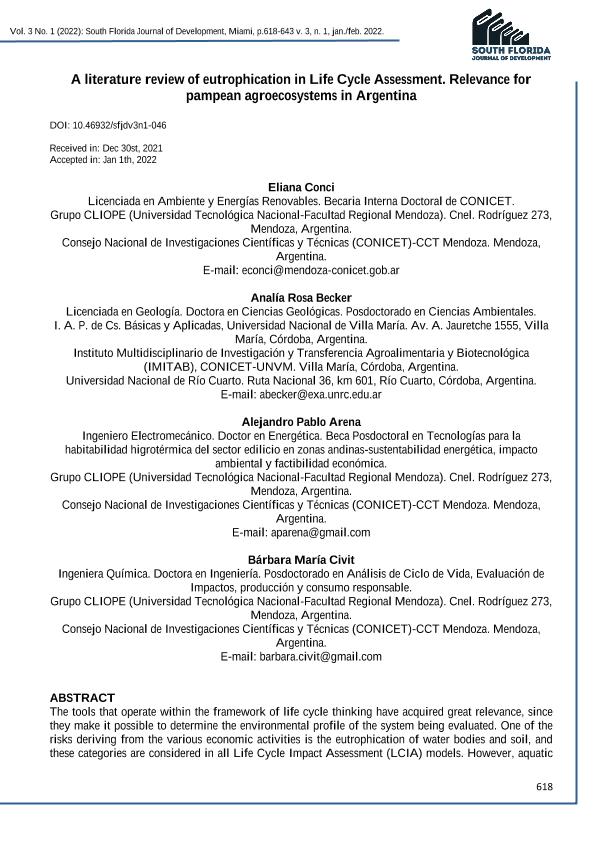Mostrar el registro sencillo del ítem
dc.contributor.author
Conci, Eliana

dc.contributor.author
Becker, Analia Rosa

dc.contributor.author
Arena, Alejandro Pablo

dc.contributor.author
Civit, Bárbara María

dc.date.available
2023-05-19T18:57:55Z
dc.date.issued
2022-03
dc.identifier.citation
Conci, Eliana; Becker, Analia Rosa; Arena, Alejandro Pablo; Civit, Bárbara María; A literature review of eutrophication in Life Cycle Assessment. Relevance for pampean agroecosystems in Argentina; South Florida Publishing; South Florida Journal of Development; 3; 1; 3-2022; 618-643
dc.identifier.issn
2675-5459
dc.identifier.uri
http://hdl.handle.net/11336/198242
dc.description.abstract
The tools that operate within the framework of life cyclethinking have acquired great relevance, since they make it possible to determine the environmental profile of the system being evaluated. One of the risks deriving from the various economic activities is the eutrophication of water bodies and soil, and these categories are considered in all Life Cycle Impact Assessment (LCIA) models. However, aquatic 619Vol. 3 No. 1 (2022): South Florida Journal of Development, Miami, p.618-643v. 3, n. 1, jan./feb. 2022.and terrestrial eutrophication is not yet exhaustively explored in the field of Life Cycle Assessment (LCA) in Argentina.A systematic analysis of specific national and international antecedents on these impact categories is carried out, focusing on terrestrial ecosystems, given the productive matrix and the advance of the agricultural frontier in the region. In the absence of research articles, it is deduced that there are no site-dependent characterizing factors (CFs)to evaluate environmental impacts in environmentally significant areas, given that there are no antecedents on the integrated analysis of aquatic and terrestrial ecosystems. The methods and theirmodels will be selected based on the one that best suits regional conditions, following the guidelines agreed upon at the Pellston Workshop 2018. This research can be further developed, continuing with the characterization of the ecosystems receiving the emissions. Argentina is currently considered one of the major agricultural regions of the world, with most activity centered in the Pampa region. The development of regional indicators for this region within the LCIA stage is of great relevance, since it will allow the quantification of environmental impacts derived from activities of great economic importance for the country, positioning itself as an advance in the study of environmental risks in the region.
dc.format
application/pdf
dc.language.iso
eng
dc.publisher
South Florida Publishing
dc.rights
info:eu-repo/semantics/openAccess
dc.rights.uri
https://creativecommons.org/licenses/by-nc-sa/2.5/ar/
dc.subject
NUTRIENTS
dc.subject
SOILS
dc.subject
LIFE CYCLE ASSESSMENT
dc.subject
REGIONALIZATION
dc.subject
MIDPOINTS
dc.subject
INDICATORS
dc.subject.classification
Otras Ciencias de la Tierra y relacionadas con el Medio Ambiente

dc.subject.classification
Ciencias de la Tierra y relacionadas con el Medio Ambiente

dc.subject.classification
CIENCIAS NATURALES Y EXACTAS

dc.title
A literature review of eutrophication in Life Cycle Assessment. Relevance for pampean agroecosystems in Argentina
dc.type
info:eu-repo/semantics/article
dc.type
info:ar-repo/semantics/artículo
dc.type
info:eu-repo/semantics/publishedVersion
dc.date.updated
2023-05-17T15:32:25Z
dc.journal.volume
3
dc.journal.number
1
dc.journal.pagination
618-643
dc.journal.pais
Estados Unidos

dc.journal.ciudad
Florida
dc.description.fil
Fil: Conci, Eliana. Consejo Nacional de Investigaciones Científicas y Técnicas; Argentina. Universidad Tecnológica Nacional. Facultad Regional Mendoza. Grupo CLIOPE. Energía, Ambiente y Desarrollo Sustentable; Argentina
dc.description.fil
Fil: Becker, Analia Rosa. Universidad Nacional de Villa María; Argentina. Consejo Nacional de Investigaciones Científicas y Técnicas. Centro Científico Tecnológico Conicet - Córdoba. Instituto Multidisciplinario de Investigación y Transferencia Agroalimentaria y Biotecnológica - Universidad Nacional de Villa María. Instituto Multidisciplinario de Investigación y Transferencia Agroalimentaria y Biotecnológica; Argentina
dc.description.fil
Fil: Arena, Alejandro Pablo. Consejo Nacional de Investigaciones Científicas y Técnicas; Argentina. Universidad Tecnológica Nacional. Facultad Regional Mendoza. Grupo CLIOPE. Energía, Ambiente y Desarrollo Sustentable; Argentina
dc.description.fil
Fil: Civit, Bárbara María. Universidad Tecnológica Nacional. Facultad Reg.mendoza. Centro de Estudio Para El Desarrollo Sustentable; Argentina. Consejo Nacional de Investigaciones Científicas y Técnicas; Argentina
dc.journal.title
South Florida Journal of Development
dc.relation.alternativeid
info:eu-repo/semantics/altIdentifier/url/https://southfloridapublishing.com/ojs/index.php/jdev/article/view/1093
dc.relation.alternativeid
info:eu-repo/semantics/altIdentifier/doi/http://dx.doi.org/10.46932/sfjdv3n1-046
Archivos asociados
